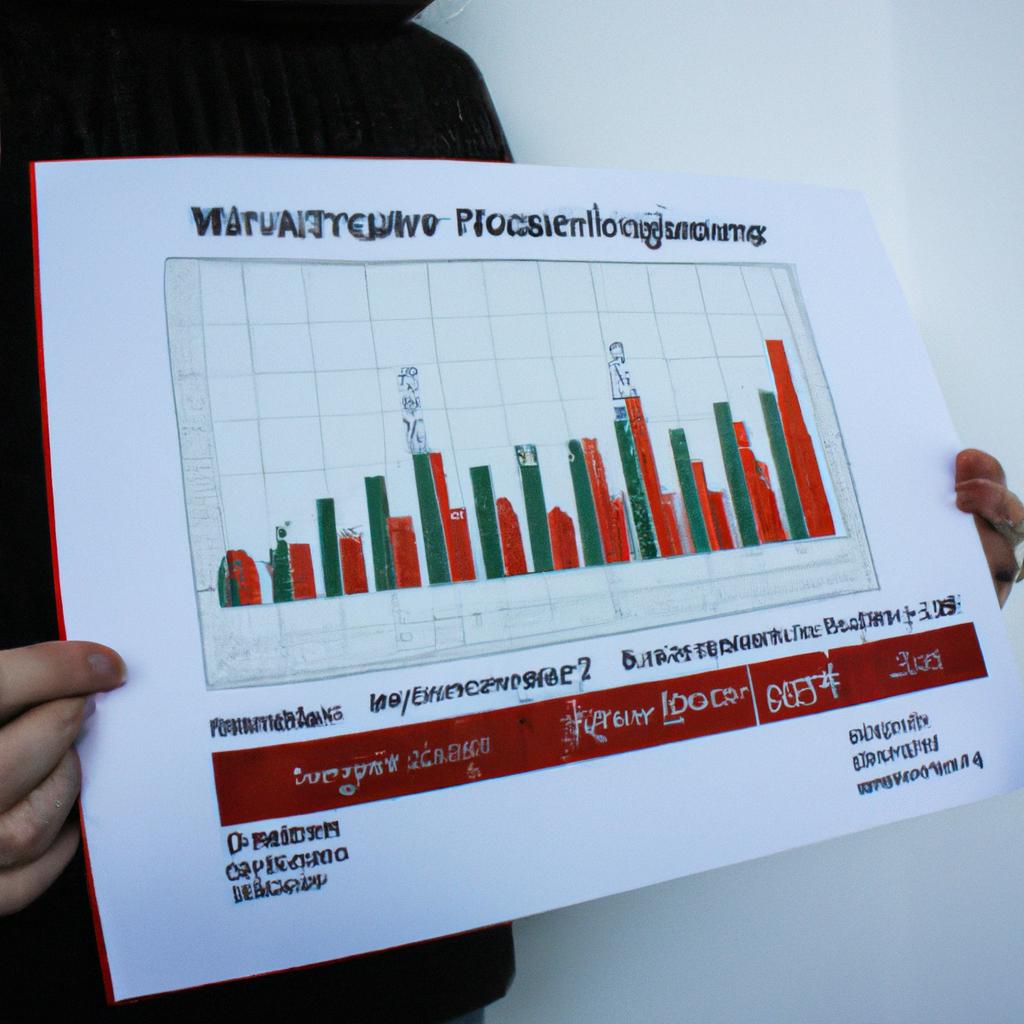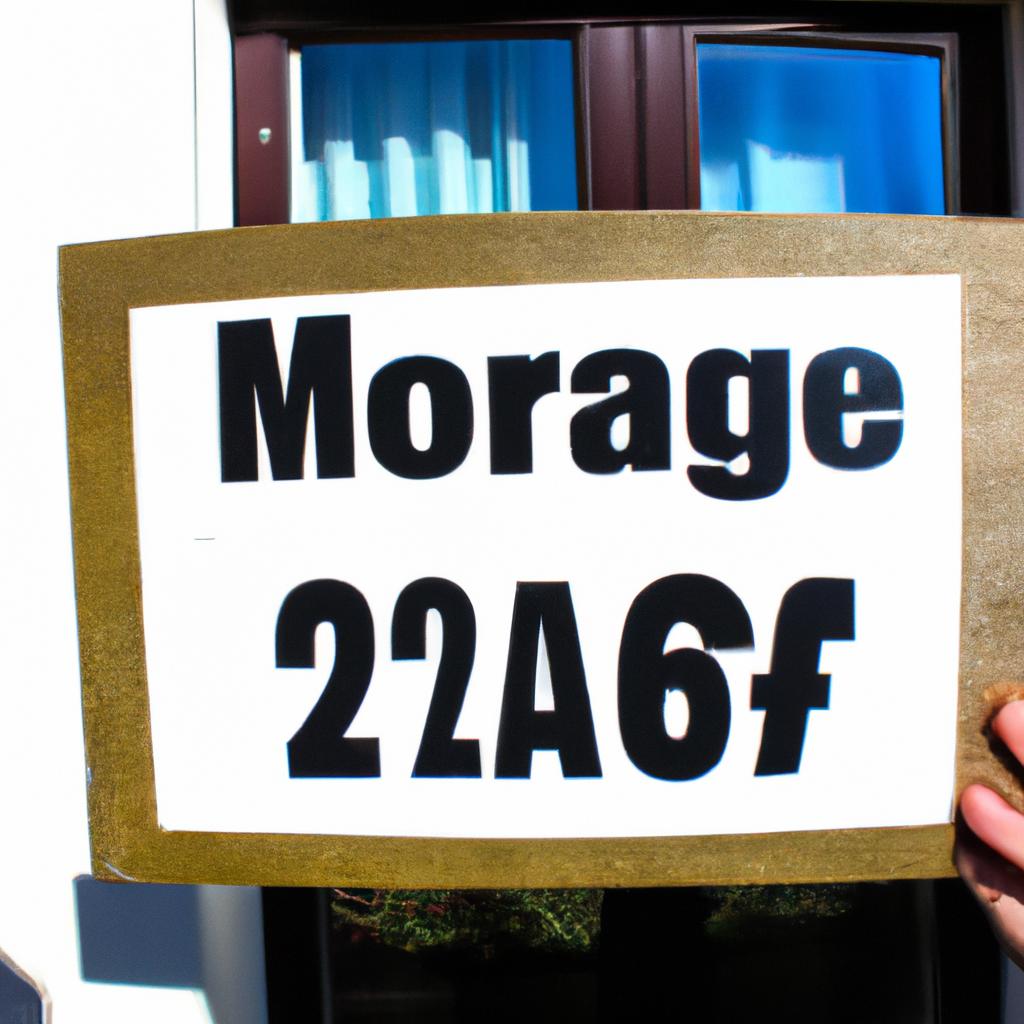In today’s housing market, obtaining a mortgage loan can be an overwhelming process. However, for eligible veterans and active-duty military personnel, the Department of Veterans Affairs (VA) offers a unique opportunity through VA loans. These loans provide flexible terms and competitive interest rates that make homeownership more accessible to those who have served their country. For instance, let us consider the case of John, a retired serviceman looking to purchase his first home. With limited savings and no prior experience in navigating the complex world of mortgages, John found himself unsure of where to begin. Luckily, he discovered the benefits of VA loans and embarked on a journey towards understanding how these loans could impact his pursuit of affordable mortgage rates.
The purpose of this comprehensive guide is to demystify VA loans and shed light on the intricacies surrounding mortgage rates within this specific context. By examining various aspects such as eligibility requirements, loan types, and factors influencing mortgage rates, we aim to equip prospective borrowers like John with valuable knowledge necessary for making informed decisions regarding their financial future. Beyond just providing an overview, we will delve into the intricacies involved in securing favorable mortgage rates under the VA loan program while adhering to academic writing standards to ensure clarity and objectivity throughout our discussion. Whether you Whether you are a veteran, active-duty military personnel, or simply interested in learning more about VA loans and mortgage rates, this guide will serve as a comprehensive resource to help you navigate the process. We will cover important topics such as:
-
Eligibility requirements: We will explore who is eligible for VA loans, including service requirements and documentation needed to prove eligibility.
-
Loan types: VA loans offer various options, including purchase loans, cash-out refinance loans, and interest rate reduction refinance loans (IRRRL). We will explain each loan type in detail and discuss their advantages and potential drawbacks.
-
Factors influencing mortgage rates: Understanding what factors affect mortgage rates can help borrowers like John secure the best possible rate. We will analyze how credit scores, loan terms, market conditions, and other variables play a role in determining the interest rate on a VA loan.
-
Additional costs and fees: It’s important to be aware of any additional costs associated with VA loans, such as funding fees and closing costs. We will outline these expenses so that borrowers can budget accordingly.
-
Tips for securing favorable mortgage rates: Armed with knowledge about eligibility requirements and factors affecting rates, we will provide practical tips for borrowers like John to increase their chances of obtaining competitive mortgage rates.
Throughout this guide, we aim to provide clear explanations backed by reliable sources to ensure accuracy and objectivity. By the end of our discussion on VA loans and mortgage rates, readers should feel empowered with the information necessary to make informed decisions regarding their homeownership journey.
What are VA loans?
VA loans are a type of mortgage loan that is guaranteed by the U.S. Department of Veterans Affairs (VA). These loans were established as part of the Servicemen’s Readjustment Act of 1944, also known as the GI Bill, to provide financial assistance to veterans and active-duty service members in achieving homeownership.
One notable example of how VA loans have been beneficial is the case of John, a retired Army veteran who served for 20 years. After leaving the military, John was eager to settle down with his family and purchase a home. However, he faced challenges due to limited savings and a lower credit score resulting from difficulties during his transition into civilian life. With conventional loans requiring substantial down payments and strict credit requirements, John found it difficult to secure financing. Fortunately, through a VA loan program, he was able to obtain favorable terms such as no down payment requirement and more lenient credit criteria. This allowed him to achieve his dream of owning a home without undue financial strain.
To gain a better understanding of VA loans, consider the following key points:
- Eligibility: To be eligible for a VA loan, individuals must meet specific criteria set by the VA. This typically includes serving on active duty or being honorably discharged after meeting certain length-of-service requirements.
- Benefits: One significant advantage of VA loans is that they often offer lower interest rates compared to conventional mortgages. Additionally, these loans do not require private mortgage insurance (PMI), which can result in considerable cost savings over time.
- Flexibility: VA loans can be used for various types of properties including single-family homes, condominiums, and multi-unit properties up to four units. This versatility allows veterans and service members greater flexibility when choosing their desired housing options.
- Assistance programs: Alongside the primary loan program offered by the VA, there are several additional support services available to help borrowers navigate the homebuying process successfully.
In summary, VA loans are a valuable resource for veterans and active-duty service members who aspire to become homeowners. These loans provide numerous benefits such as competitive interest rates, no PMI requirement, and greater flexibility in property selection. Understanding the eligibility requirements and available assistance programs can help potential borrowers make informed decisions regarding their homebuying journey.
Moving forward, let’s explore the eligibility requirements for VA loans and how individuals can determine if they qualify for this type of mortgage financing.
Eligibility requirements for VA loans
Having understood the basics of VA loans, let us now explore the eligibility requirements that must be met in order to qualify for such a loan.
Eligibility Requirements for VA Loans
To obtain a VA loan, individuals need to meet certain criteria set forth by the Department of Veterans Affairs (VA). These requirements are designed to ensure that only eligible veterans and active-duty service members have access to this unique mortgage option. For instance, one requirement is having served at least 90 consecutive days during wartime or 181 days during peacetime. This criterion ensures that those who have made significant contributions to our nation’s defense can benefit from the advantages provided by VA loans.
In addition to meeting the specific length of service requirements, other eligibility factors come into play. One such factor involves obtaining a Certificate of Eligibility (COE), which verifies an individual’s eligibility for a VA loan. The COE can be obtained through various means, including online applications or direct contact with the VA. It serves as proof of military service and is required when applying for a VA loan.
To further determine eligibility, lenders consider credit scores and debt-to-income ratios. While there is no minimum credit score mandated by the VA, most lenders require applicants to have a satisfactory credit history. Additionally, while there is flexibility regarding income qualifications, borrowers must demonstrate their ability to repay the loan within reasonable limits.
Meeting these eligibility requirements opens up opportunities for veterans and active-duty service members to access favorable mortgage rates through VA loans.
Benefits of VA Loans
When considering whether a VA loan is right for you, it’s important to understand its distinct advantages:
- No down payment: Unlike conventional mortgages where down payments are typically required, qualifying individuals can secure a home without any upfront payment.
- Lower interest rates: Historically speaking, VA loans tend to offer lower interest rates compared to traditional mortgages.
- No private mortgage insurance (PMI): With other types of loans, borrowers are often required to pay a monthly PMI premium if they have less than 20% equity in their home. However, VA loans do not require this additional cost.
- Flexible refinancing options: The VA offers various refinancing programs that allow homeowners with existing VA loans to lower their interest rates or convert an adjustable-rate mortgage into a fixed-rate one.
By understanding the eligibility requirements and advantages associated with VA loans, individuals can make informed decisions regarding their mortgage needs.
Now that we have explored the eligibility requirements and benefits of VA loans, let’s delve deeper into how these mortgages work and what makes them unique.
Advantages of VA loans
Eligibility requirements for VA loans provide a clear framework to determine who qualifies for this type of mortgage. Let’s take the example of John, a retired veteran, to illustrate these eligibility criteria.
To be eligible for a VA loan, individuals must meet specific service requirements. For instance, they should have served at least 90 consecutive days during wartime or 181 days during peacetime. Alternatively, if an individual has served less than the required time but was discharged due to a service-related disability, they may still be eligible.
In addition to the length of service, there are other factors that influence eligibility for VA loans:
- Credit score: While there is no minimum credit score requirement set by the Department of Veterans Affairs (VA), most lenders expect borrowers to have a credit score of around 620 or higher.
- Income stability: Lenders typically assess an applicant’s income stability and ability to repay the loan. A steady employment history and sufficient income are crucial in demonstrating financial responsibility.
- Property requirements: The property being purchased with a VA loan must meet certain standards set by the VA, ensuring it is safe and suitable for living conditions.
- Certificate of Eligibility (COE): Applicants need to obtain their COE from the VA as proof of their eligibility.
Now let’s explore how these eligibility requirements translate into advantages for veterans seeking homeownership through VA loans.
| Advantages of VA Loans |
|---|
| – No down payment |
| – Lower interest rates |
| – No private mortgage insurance (PMI) requirement |
| – Easier qualification process |
These benefits can significantly decrease financial burdens on veterans looking to purchase homes. With no down payment required, veterans can conserve funds while still achieving their dream of homeownership. Moreover, lower interest rates compared to conventional mortgages enable veterans to save money over the life of their loan.
By not requiring private mortgage insurance (PMI), VA loans further alleviate financial stress for veterans. This insurance, typically mandatory in conventional mortgages with low down payments, can add a significant amount to monthly mortgage payments.
Lastly, the qualification process for VA loans is often more lenient compared to other loan types. While creditworthiness is still considered, lenders may be willing to work with individuals who have less-than-perfect credit or higher debt-to-income ratios.
Understanding the eligibility requirements and advantages of VA loans will empower veterans like John on their path towards homeownership. Now let’s delve into the next section, which focuses on how to apply for a VA loan and navigate through the application process smoothly.
How to apply for a VA loan
Advantages of VA Loans
When it comes to obtaining a mortgage, veterans and active-duty military personnel have the advantage of accessing loans specifically tailored for their needs. Let’s consider the case of John, a retired Army veteran who is looking to buy his first home. With a VA loan, he can enjoy several benefits that make homeownership more accessible and affordable.
Firstly, one major advantage of VA loans is the absence of a required down payment or private mortgage insurance (PMI). This significant cost-saving feature allows individuals like John to secure financing without having to save up for a substantial upfront payment. As a result, veterans can become homeowners sooner than they might have expected.
In addition to no down payment requirement, another benefit of VA loans is typically lower interest rates compared to conventional mortgages. This reduced rate translates into long-term savings for borrowers over the course of their loan repayment period. For instance, if we compare two identical homes with different types of financing – one using a traditional mortgage and the other utilizing a VA loan – John could potentially save thousands of dollars in interest payments throughout the life of his loan.
Furthermore, VA loans offer flexibility when it comes to credit requirements. While lenders still evaluate creditworthiness based on factors such as income stability and debt-to-income ratios, there may be more leniency regarding past financial hardships or lower credit scores. This broader acceptance criterion makes it easier for veterans like John to qualify for a mortgage even if they don’t meet all the typical lending standards.
Consider these emotional aspects related to VA loans:
- Peace of mind: Veterans can feel at ease knowing that their service is recognized through specialized loan options.
- Gratitude: The availability of favorable terms demonstrates society’s appreciation for those who have served our country.
- Empowerment: Accessible homeownership opportunities empower veterans by providing them with stable housing options.
- Stability: By eliminating barriers such as high down payments or PMI, veterans can establish a solid foundation for themselves and their families.
| Emotional Aspects of VA Loans |
|---|
| Peace of mind |
| Gratitude |
| Empowerment |
| Stability |
In conclusion, VA loans offer numerous advantages that make them an attractive option for veterans and active-duty military personnel. From eliminating the need for a down payment to providing more favorable interest rates, these specialized mortgages ease the path to homeownership for those who have served our country. In the following section, we will delve into the specific limits and guidelines associated with VA loans, ensuring you are well-equipped to navigate this unique financing opportunity.
VA loan limits and guidelines
VA Loan Limits and Guidelines
When considering a VA loan, it is important to understand the limits and guidelines that govern this type of mortgage. These restrictions ensure that the loans are used appropriately and provide veterans with fair access to affordable housing options. Let’s explore some key aspects of VA loan limits and guidelines.
To illustrate how these limits work in practice, let’s consider the case of John, a retired veteran looking to purchase a home using a VA loan. John has identified his dream house but wants to know whether he can qualify for a VA loan based on its price. This example will help us understand how VA loan limits impact borrowers like John.
One crucial aspect of VA loans is the maximum amount that an eligible borrower can borrow without making a down payment. The Department of Veterans Affairs sets these limits based on each county’s median home prices. For instance, if John’s desired property exceeds the allowable limit set by his county, he may need to make a down payment or seek additional financing options.
Understanding these limitations ensures that veterans have realistic expectations when searching for properties within their budget. Here are four key points about VA loan limits:
- The maximum amount varies depending on the location.
- Borrowers can still apply for higher amounts exceeding local median prices but may need to make a down payment for the difference.
- Some high-cost areas have higher loan limits due to increased housing expenses.
- Reaching out to lenders who specialize in VA loans can provide valuable insight into available options.
Now let’s take a closer look at some general guidelines associated with VA loans through the following table:
| Guideline | Description | Impact |
|---|---|---|
| No Mortgage Insurance | Unlike conventional mortgages, no private mortgage insurance is required with VA loans. | Lower monthly payments |
| Flexible Credit Standards | While credit requirements exist, they tend to be more forgiving compared to traditional mortgages. | Easier qualification for borrowers with less-than-perfect credit |
| Funding Fee | VA loans require a funding fee, which can be financed into the loan amount or paid upfront. | Additional cost to consider when obtaining a VA loan |
| Occupancy Requirement | Borrowers must certify they intend to occupy the property as their primary residence. | Ensures that VA loans are used for veterans’ housing needs |
Understanding these guidelines provides potential borrowers like John with valuable insights into what to expect when applying for a VA loan.
As we delve deeper into the intricacies of VA loans, our next section will provide tips on securing the best deal possible. By following these suggestions, veterans can maximize their chances of getting an advantageous mortgage offer while avoiding common pitfalls in the process. So let’s explore some helpful pointers in our upcoming section on “Tips for getting the best VA loan deal.”
Tips for getting the best VA loan deal
Transitioning from the previous section on VA loan limits and guidelines, it is essential to understand the eligibility requirements for obtaining a VA loan. Let’s consider an example of John, a retired military personnel who wishes to purchase his dream home using a VA loan.
To be eligible for a VA loan, certain criteria must be met. First and foremost, individuals like John must have served at least 90 consecutive days during wartime or 181 days during peacetime. Additionally, National Guard members and reservists are required to complete at least six years of service before becoming eligible. Once these service requirements are fulfilled, potential borrowers need to obtain a Certificate of Eligibility (COE) from the Department of Veterans Affairs.
Once John has established his eligibility, he can take advantage of several benefits offered by VA loans:
- No down payment requirement: This allows veterans like John to purchase homes without having to save up for a large down payment.
- Competitive interest rates: As compared to conventional mortgage rates, VA loans often offer lower interest rates, making homeownership more affordable.
- No private mortgage insurance (PMI): Unlike many other mortgage programs, VA loans do not require PMI premiums. This saves borrowers money over time.
- Flexible credit requirements: While lenders still consider credit scores when evaluating applications, there is typically more flexibility in accepting lower credit scores with VA loans.
| Benefit | Description |
|---|---|
| No Down Payment Requirement | Eliminates the need for upfront cash savings towards a down payment |
| Competitive Interest Rates | Offers lower interest rates than traditional mortgages |
| No Private Mortgage Insurance | Saves borrowers additional costs associated with PMI premiums |
| Flexible Credit Requirements | Allows applicants with less-than-perfect credit history to qualify more easily |
In summary, meeting the eligibility requirements is crucial for accessing the advantages provided by VA loans. By eliminating the need for a down payment, offering competitive interest rates, and providing flexibility in credit requirements, these loans aim to support veterans like John on their path to homeownership.
Please let me know if you would like any further information or assistance!
 SMI Loan
SMI Loan



